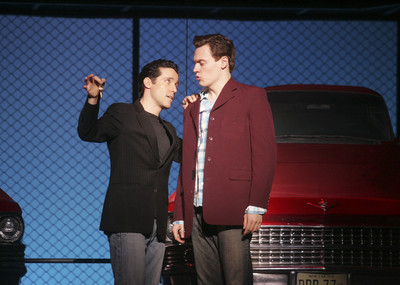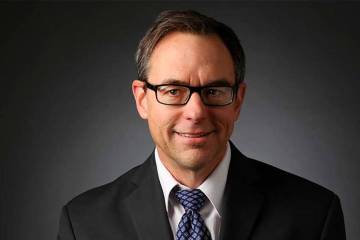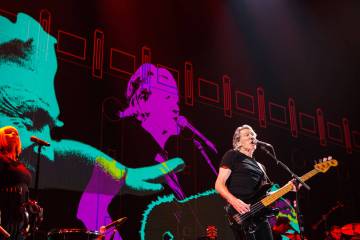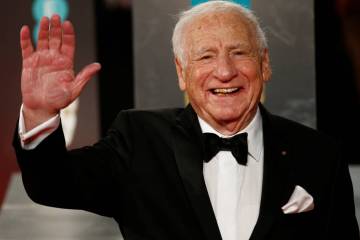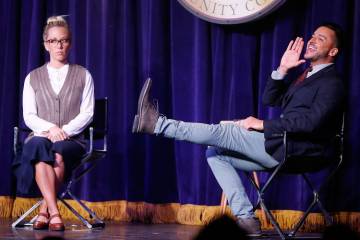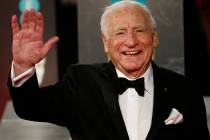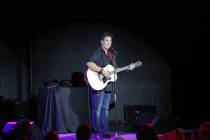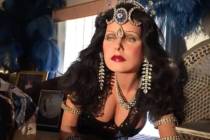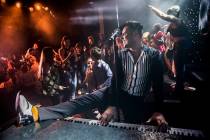Getting Personal
It's the show without show tunes that makes big boys cry.
The biography of Frankie Valli & The Four Seasons that has become bigger than Frankie Valli & The Four Seasons.
It's "Jersey Boys," and with the fourth sit-down company of the Broadway hit opening on the Strip this weekend -- while a touring cast is still on the road -- it's hard not to call it a phenomenon.
"I hesitate to use that word, but I'm afraid that's much of what's going on," admits Bob Gaudio, the musical architect of The Four Seasons who helped steer the title to the stage.
The musical debuts today in a new 1,700-seat theater at the Palazzo; though ticket prices aren't discounted, the first month is designated as preview performances before grand opening festivities May 3, Valli's 74th birthday.
It took more time to break in the theater than the stars, who were drawn from other casts and recently teamed for a pre-Christmas run in San Francisco. They're well familiar with the effect "Jersey Boys" has on people.
"You know this is a phenomenon, you know it's been running on Broadway for three years, and still there's nothing that could prepare me for the reaction that I would feel standing on that stage," says Jeff Leibow, who plays late Four Seasons member Nick Massi.
"It just has this, I guess, magical set of ingredients," says Des McAnuff, the versatile director who helped create the Huckleberry Finn musical "Big River" in 1985 and another unconventional rock title, "The Who's Tommy" in 1993. Breaking down those ingredients helps explain the success.
You know the songs but not the story.
In its earliest days, "Jersey Boys" was quickly tagged as a "jukebox musical," an increasingly derisive term for the recent trend of shows which repurpose familiar songs instead of writing new ones.
But unlike, say, "Mamma Mia!," this one tells the band's story. "Our secret weapon, in a sense, is this fabulous story no one expects," McAnuff says.
"You listen to Marshall (Brickman, the writer previously best known for Woody Allen collaborations such as "Annie Hall") and Rick (Elice, co-writer) talk about how shocked they were when their idea of what the show would be changed," Leibow notes. "They actually stopped and said, 'We don't need a jukebox musical. We have a real story.' "
The familiar songs anchor a plot that strays beyond the music business into "The Sopranos" territory. The young band rises above petty crime and a tough neighborhood, but not without forging a devil's alliance with Gyp DeCarlo (Ken Krugman), the mobster who oversaw Genovese crime family operations in New Jersey.
"This is one dark tale. In fact, we couldn't get it all in there," McAnuff says. "All of us who grew up listening to those pop songs, I think we had no idea that was the story of The Four Seasons. I think it's the juxtaposition of the innocent songs and this really, at times, very dark story and really engaging story."
On the other hand, the story is familiar.
Reviews of "Jersey Boys" often compare it to "Behind the Music," the VH1 documentaries that were at peak popularity when "Jersey Boys" debuted in 2004, for a pre-Broadway run at the La Jolla Playhouse.
The specifics of each "Behind the Music" differed, but most followed a basic narrative arc: A band rises from humble beginnings, hits the big time and then stumbles -- either from drugs, internal dissent or both -- and then finds redemption and a comeback.
"This is kind of a classic tale in many ways," McAnuff says.
"I think in our country, celebrity has replaced royalty. In centuries past, theater was obsessed with kings and queens and nobility. We're now obsessed with celebrity."
The plot takes its time "climbing the mountain," as McAnuff calls the slow windup. The streetwise Seasons struggle through various misadventures until hitting the magic combination of young falsetto-voiced Valli (Rick Faugno) and songwriter Gaudio (Erich Bergen).
When the first act finally delivers "the big three" -- as Jeremy Kushnier, who plays the group's black sheep, Tommy DeVito, calls "Sherry," "Big Girls Don't Cry" and "Walk Like A Man" -- "You look up in the audience afterward and you see grown men, steelworker kind of men, crying because they remember the first time they heard that.
"They come up to you afterward and go, 'I've never seen theater in my life, and this is the most amazing thing I've ever heard.' "
It plays more like a movie than a musical.
If one thing unifies the diverse work of McAnuff, now the artistic director for Canada's Stratford Shakespeare Festival, it's a cinematic approach to the stage.
In "Jersey Boys," scenes bleed in to one another without a pause to change scenery; many backdrops are projections, and cast members often carry their own props. Some of the action unfolds to narration, a la Martin Scorsese's "Goodfellas" and "Casino."
"This is the most complicated show Des has ever directed, but it doesn't look like it at all," says producer Michael David, McAnuff's longtime business partner in Dodger Theatricals.
"It goes by at breakneck speed," McAnuff concedes, noting the story covers two decades. "We have a lot of ground to cover. I'm glad we don't just do the traditional seven or eight songs an act.
"I feel that we live in an age where people expect visual communication," he adds. "I think those principles need to be applied to the theater. Particularly when you're dealing with rock 'n' roll, you're probably more inspired to do that than you would be normally."
"This is a completely different show than anything that has ever played here before or, I think, ever will again," Kushnier says. "This was never a musical. Nobody ever walked into this thing saying, 'This is a musical theater piece.' Des is a rock 'n' roll guy."
It feels real.
Everyone loves a show business rags-to-riches saga, but producer David says "Jersey Boys" strikes a more universal chord. "It feels authentic as opposed to show business," he says. "It's about the family you choose versus the family you were born into. The sacrifices you make to get out of Newark and really take the ride."
"This show does seem to have kind of a common touch," McAnuff agrees. And each premiere of a new edition -- they're getting to be a habit; the London opening was only two weeks ago -- reunites the remaining band members and keeps their complicated story open-ended.
"It always has felt very personal," says Valli, who recently recorded a new album, "Romancing the '60s," with Gaudio producing. "It took a lot to think that we wanted to do this, to start with. One of the things you really have to do is look at your life and say, 'Do I want to do this? Will anybody be hurt?' There's just a lot of soul-searching that goes on.
"We felt really good prior to going to La Jolla, but truth is, we didn't have a clue what we were going to see," Gaudio recalls.
"We did have veto power, so we could basically say, 'This is just not feeling right for us and it's our lives up there.' ''
Instead, "What was so surprising for us was the impact it had on the audience," Gaudio recalls. "Frankie and I essentially looked at each other on opening night and said, 'My God, if this ever gets to Broadway, watch out.' "
Contact reporter Mike Weatherford at mweatherford@reviewjournal.com or (702) 383-0288.
what: "Jersey Boys" when: 7 p.m. Thursdays, Fridays, Sundays and Mondays; 7 and 10 p.m. Saturdays and Tuesdays where: Jersey Boys Theatre at the Palazzo, 3325 Las Vegas Blvd. South tickets: $70.70-$249.70 (414-9000)



